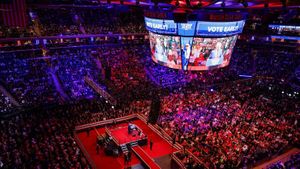Thousands gathered at Madison Square Garden on Sunday for former President Donald Trump's campaign rally, making his hopes clear—he aims to secure his home state of New York. Trump vowed to honorably win back the state, positioning it as pivotal for his campaign. Yet, his messages were overshadowed by the crude antics of the performers preceding him, which sparked significant backlash.
One comedian, known for his offensive humor, made various controversial jokes including disparagements about Puerto Ricans and Black people. These comments caught the attention of many, leading the Trump campaign to swiftly distance themselves from such remarks, insisting they do not reflect the views of the former president. Republican Rep. Anthony D'Esposito, who is of Puerto Rican descent, expressed his disappointment on social media, emphasizing pride in his heritage.
With only nine days left before Election Day, polls reflect tight competition between Trump and Democratic Vice President Kamala Harris, with latest figures showing Harris at 50% compared to Trump's 49% among likely voters. Both candidates are channeling their energies toward key issues including immigration, the recent Israel-Hamas conflict, and crime, which resonate strongly with their respective bases.
During the rally, Trump focused on familiar campaign themes including his plans for the economy and immigration reforms, assuring his supporters of rapid relief from inflation and economic burdens. Amid clashes of opinion, he expressed gratitude toward New York City Mayor Eric Adams for highlighting the unsustainability of the migrant situation and referenced Adams's own legal challenges.
Meanwhile, out west, Alaskan voters prepare for their own decisive moments on November 5. The state's upcoming general election is expected to not only influence who gets its three electoral votes but also hold significant consequences for control of the U.S. House. At stake is the seat currently held by Democratic U.S. Rep. Mary Peltola, who faces stiff competition from Republican Nick Begich, among others.
Peltola originally won her seat following the passing of long-serving Republican congressman Don Young, reclaiming the seat from the clutches of multiple Republican contenders. This election marks another encounter for Peltola, who has garnered considerable media attention and financial backing, against Begich, who is now the sole remaining Republican challenger after two primary candidates dropped out.
The intricacies of Alaska's ranked-choice voting system mean any lack of majority will push the race to subsequent rounds of vote redistribution, which makes the stakes higher than ever for both leading candidates. Voters will also face the debate over potential changes to electoral processes, with one measure poised to eliminate ranked-choice voting altogether.
Across the political spectrum, various campaigns are ramping up their visibility, hoping to woo undecided voters and those outside traditional party boundaries. This is especially pertinent for Kamala Harris, who, in her final week of campaigning, encourages voters to envisage the ramifications of their choice on November 5, especially relating to the integrity of U.S. democracy.
Looking to engage moderates and independent voters, Harris aims to steer the conversation toward the broader risks associated with Trump's leadership style, which many observers have likened to authoritarianism. Her messaging strategically centers on recalling January 6, 2021, highlighting the division and chaos stemming from Trump's rhetoric, particularly as citizens weigh the prospect of another Trump presidency.
While Democratic supporters are feeling the tension, with apprehensive anticipation of the possible outcomes, Harris's team is striving for optimism with high expectations for voter turnout. Their strategy includes amplifying discussions around economic issues, which progressives fear might not resonate sufficiently with more centrist voters.
With the race tightening and each candidate expected to target battleground states aggressively, the messaging and public perception shifts over the next week could play pivotal roles. Both candidates are honing their focus on seven key swing states, mapping out their final pushes as they aim for the electoral prizes needed to claim victory on November 5.
For now, with Madison Square Garden echoing the chants of Trump supporters and Alaskan voters prepping for impactful decisions, the atmosphere buzzes with the expectation of what lies just ahead. November 5 promises to be not just another Election Day, but potentially transformative for the fabric of American politics.



